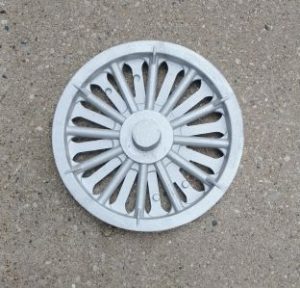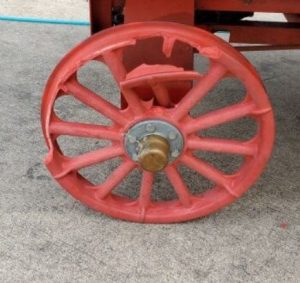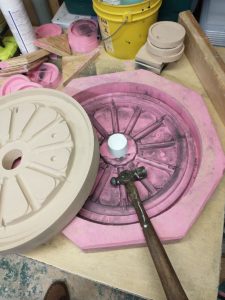
Example of a failure…or is it?
The Reality of Failure in Fast-Paced Innovation
In the fast-paced world of product development, one truth stands tall: failure is inevitable. Whether it’s a flawed process or a weak product, you must face the problem—or face the end.
You’ve probably heard the phrase “Get it wrong quickly.” It’s a mantra used by leading companies to accelerate learning. Critics see failure; innovators see feedback. We want to fail early, learn fast, and build better.
This story follows that journey—how Prototype Industries took on a tough challenge from its sister company Go-KartGuru.com, and what it really means to “face the music” in engineering.
The Spark: Model T Go-Karts and a Simple Problem
It all started with a need.
Go-KartGuru.com, our sister company dedicated to go-kart design and education, had a recurring problem from customers. Model T go-karts—those crowd-pleasing parade favorites driven by kids, clowns, and grandparents—had a fatal flaw: plastic wheels that cracked and failed. Some versions even used wooden spokes, which didn’t last either.

Plastic wheels break especially over time.
Customers kept asking the same question: “Where can we get reliable parts?”
At first, the honest answer was “We don’t know yet.” But the market was trying to teach us something important:
“Love the customer. Fall in love with the customer. See the world upside down.”
The solution seemed simple—create durable wheels at an affordable price. But as we’d soon discover, the road to reliability wasn’t simple at all.
First Attempts: Urethane Wheels
We began small.
Go-KartGuru produced urethane wheels for about a year to test the market. It was a noble effort but ultimately one of those groan-worthy projects—labor-intensive, costly, and only a partial improvement. The design problem remained.
That’s when Prototype Industries stepped in to help find a true engineering solution.
Enter the Aluminum Wheel Era
We knew intuitively that aluminum was the answer.
So, we dove into research and started contacting foundries for quotes. The response was eye-opening—the cost of entry was sky-high.
At that point, most would have quit. But that’s not our style. As we like to say at Prototype Industries:
“Don’t tell us it can’t be done—it just makes us work harder.”
So we rolled up our sleeves and did what we do best: experiment and build.
Our in-house knowledge included:
- Green sand casting
- Petrobond sand casting
- Plaster casting
- Solid mold casting
- Binder-based sand casting
We had the expertise—but even experts must eventually face the music.
Facing the Music: Knowing Your Limits
As Clint Eastwood’s Sergeant Callahan said:
“A man’s got to know his limitations.”
In business terms: “No company is an island. Enter the division of labor.”
Despite our innovations and cost-saving techniques, aluminum casting proved time-intensive. With our small foundry setup, we could produce six wheels at a time—great for prototypes, not for scale.
Meanwhile, the big casting houses—the ones that had fully invested in automation and customer volume—could do it faster and cheaper.
It was the same revelation Henry Ford had when he turned “one-at-a-time” assembly into a scalable system. Big foundries use that same principle today. And as entrepreneurs, we have to decide when to keep developing in-house and when to collaborate up the chain.
The Trust Factor
From the beginning, we understood the cost of entry. What we didn’t expect was how much it would test our ability to trust others with our process.
That hesitation—fear of being burned—is what holds many innovators back.
As Proverbs 13:23 says:
“Much food is in the tillage of the poor; but there is that is destroyed by reason of injustice.”
Without trust, even good work can be wasted.
We see that same hesitation in our Go-KartGuru customers. Some even ask, “Is this site legit?”—a natural concern in today’s market.
Trust, after all, is built slowly through Know, Like, and Trust.
Innovation isn’t just about inventing; it’s about trusting the right people to move your idea forward.
A Breakthrough: Supreme Cores and Supreme Castings
After nearly twenty phone calls and multiple rejections, we finally found the right partners: Supreme Cores and Supreme Castings in Milwaukee.
A foundry in Peoria had wanted to help but admitted logistics were an obstacle. They referred us to Supreme Cores—and that connection changed everything.
(And no, this isn’t a paid endorsement—it’s a celebration of how the free market still works when the right people connect.)
Supreme Cores specializes in cores of all shapes and sizes—every day, all day.
As entrepreneurs, we often feel like the “low man on the totem pole,” doing too much ourselves. But those frustrations often point to opportunity.
When larger players overlook smaller innovators, new markets open up—and one day, those innovators lead the way forward.
Supreme Cores worked seamlessly with our homegrown tooling—what some might call “primitive”—and turned out beautiful, functional molds. We tested them, and they exceeded expectations. Supreme Castings proved out the tooling and made flawless parts on the first pours. With the added finishing touches, the wheels turned out phenomenal.

Primitive tooling that works really well
Encouraged, we refined our tooling and repeated the process. Once again, the results were fantastic.
Conclusion: Learning to Play in Harmony
“Facing the music” isn’t about failure—it’s about honesty and growth.
It’s knowing your limits, trusting your partners, and understanding that even experienced shops like Prototype Industries sometimes need to call in bigger players to reach the next level.
Innovation is rarely a solo act—it’s a symphony.
And when you find the right partners who share your rhythm and your drive to solve problems, that’s when the music truly plays.
At Prototype Industries, we specialize in rapid prototyping, small-run production, and process problem-solving—helping inventors and companies bridge the gap between concept and scale.
If you’ve got a project that needs a breakthrough—or you’ve hit your own “aluminum wheel moment”—
👉 Let’s face the music together.
Visit PrototypeIndustries.com
Author Bio
 Robert Gamble is the founder of Prototype Industries and Go-KartGuru.com. With over 20 patents and decades of hands-on engineering experience, Robert is passionate about transforming ideas into working solutions. From prototype development to full-scale production support, he helps innovators build smarter, faster, and better.
Robert Gamble is the founder of Prototype Industries and Go-KartGuru.com. With over 20 patents and decades of hands-on engineering experience, Robert is passionate about transforming ideas into working solutions. From prototype development to full-scale production support, he helps innovators build smarter, faster, and better.
